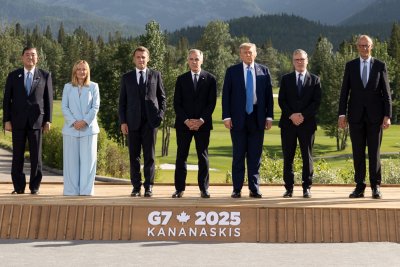
June 29 (UPI) — Group of Seven nations agreed to exempt U.S. companies from a 15% minimum corporate tax rate, the countries said in a joint statement.
The nonbinding deal was announced Saturday but still requires approval from the 38-member Organization for Economic Co-operation and Development that established the 2021 agreement on taxing companies. G-7 nations are part of the OECED.
U.S. Treasury Secretary Scott Bessent had proposed a “side-by-side solution” for American-headquartered companies that would be exempt from the Income Inclusion Rule and Undertaxed Profits Rule “in recognition of the existing U.S. minimum tax rules to which they are subject.”
The massive spending bill now being considered in Congress originally included a “revenge tax” that would have imposed a levy of up to 20% on investments from countries that taxed U.S. companies.
“I have asked the Senate and House to remove the Section 899 protective measure from consideration in the One, Big, Beautiful Bill,” Bessent wrote in a multi-post thread on X on Thursday.
The House has approved the massive legislation and the Senate is considering it.
“It is an honorable compromise as it spares us from the automatic retaliations of Section 899 of the Big, Beautiful Bill,” Italian Finance Minister Giancarlo Giorgetti told local media.
“We are not claiming victory, but we obtained some concessions as the U.S. pledged to engage in OECD negotiations on fair taxation,” an unnamed French official told Politico Europe. The official called the “revenge tax” a potentially “huge burden for French companies.”
Trump has criticized this provision because he said it would limit sovereignty and send U.S. tax revenues to other countries.
“The Trump administration remains vigilant against all discriminatory and extraterritorial foreign taxes applied against Americans,” Bessent wrote Thursday.
Trump has imposed a July 9 deadline for U.S. trading partners to lower taxes on foreign goods, threatening high duties on the worst offenders, including 50% on goods from the 27 European Union members. In April, a baseline tariff was imposed on most U.S. trading partners, with higher rates on certain companies and products.
In 2021, nearly 140 countries agreed to tax multinational companies at the 15% minimum, regardless of where they were headquartered.
In late April, the European Union, Britain, Japan and Canada agreed to exempt the United States from the 15% minimum tax on companies.
“Delivery of a side-by-side system will facilitate further progress to stabilize the international tax system, including a constructive dialogue on the taxation of the digital economy and on preserving the tax sovereignty of all countries,” the joint statement read.
The agreement, according to the statement, would ensure that any substantial risks identified “with respect to the level playing field, or risks of base erosion and profit shifting, are addressed to preserve the common policy objectives of the side-by-side system.”
The G-7 includes Britain, France, Germany, Italy in Europe, as well as Canada, Japan and U.S. Before 2014, the group was known as the G-8 until Russia was expelled after annexing the Crimea region of Ukraine.
The chairs of the House and Senate committees responsible for tax policy cheered the agreement.
“We applaud President Trump and his team for protecting the interests of American workers and businesses after years of congressional Republicans sounding the alarm on the Biden Administration’s unilateral global tax surrender under Pillar 2,” Idaho Sen. Mike Crapo, chair of the Senate Finance Committee, and Missouri Rep. Jason Smith, chair of the House Ways and Means Committee, said in a press release.
The agreement also, however, has its critics.
“The U.S. is trying to exempt itself by arm-twisting others, which would make the tax deal entirely useless,” Markus Meinzer, director of policy at the Tax Justice Network, told Politico Europe. “A ship with a U.S.-sized hole in its hull won’t float.”